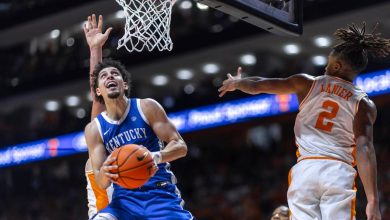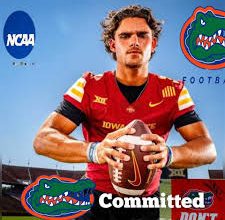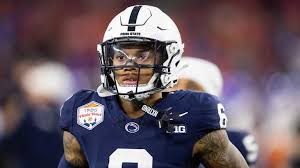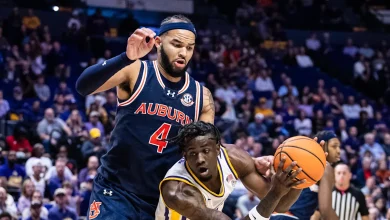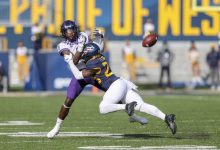Micah Parsons heading to the Chicago Bears? Jerry Jones and the Dallas Cowboys on the verge of making a huge mistake
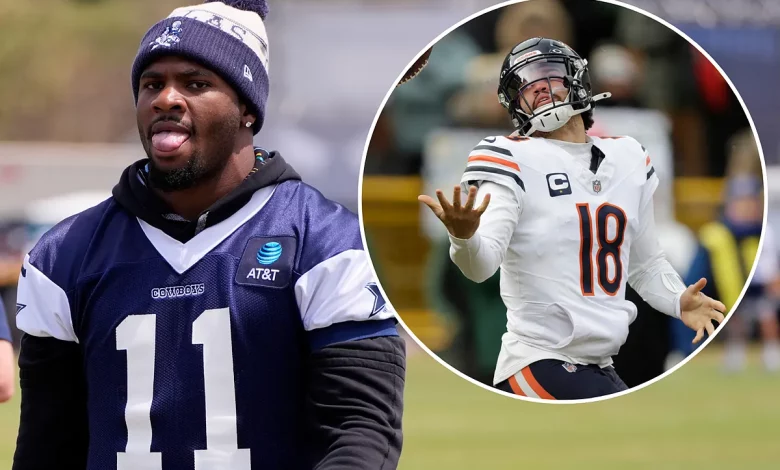
The NFL landscape is constantly shifting, with blockbuster trades, strategic moves, and franchise-altering decisions happening each season. Among the most talked-about topics in recent times is the speculation surrounding Dallas Cowboys linebacker and pass-rushing sensation Micah Parsons and whether he might be headed to the Chicago Bears. This hypothetical scenario has sparked intense debate among fans, analysts, and insiders, especially given the Cowboys’ current trajectory and the Bears’ rebuilding efforts.
At the heart of this speculation lies a broader question: Is Jerry Jones, the Cowboys owner and general manager, risking a costly mistake by potentially letting Parsons go? And if Parsons does depart Dallas, what could that mean for the Cowboys’ future? Conversely, what would it mean for the Bears to acquire such a transformative player?
This analysis will explore the background of Parsons’ rising star, the reasons behind the trade speculation, the potential consequences for Dallas, and whether the Bears would be wise to pursue such a move. We’ll also examine the strategic implications for both franchises and the broader NFL landscape.
Micah Parsons: The Defensive Franchise Player
Micah Parsons entered the NFL with immense expectations as the 12th overall pick in the 2021 draft out of Penn State. From his first season, Parsons demonstrated that he was not just a promising linebacker but a game-changing force. His combination of speed, strength, instinct, and pass-rushing ability set him apart as one of the league’s most disruptive defenders.
In his sophomore season (2022), Parsons established himself as a Defensive Player of the Year candidate, tallying double-digit sacks, forcing turnovers, and consistently applying pressure on opposing quarterbacks. His versatility allowed the Cowboys to deploy him in numerous roles—linebacker, edge rusher, even occasionally lining up as a defensive end—making him one of the most dynamic defenders in the league.
Parsons is not just a star; he’s a franchise-defining player. His impact on Dallas’s defense has been profound, elevating a unit that was already talented but now centers around his disruptive presence. His leadership qualities, passion, and work ethic have also earned him respect within the locker room and among fans.
Given his youth (born in 1999), Parsons is under team control for several more seasons, and Dallas has a vested interest in building around him. Losing such a player would be a seismic shift, which is why trade rumors and speculation about his future are so provocative.
The Chicago Bears: Rebuilding and the Allure of a Defensive Superstar
The Chicago Bears have been in a rebuilding phase since their Super Bowl appearance in 2006. Despite some flashes of promise, the team has struggled with consistency, especially on offense and defense. The Bears’ recent drafts, coaching changes, and roster moves aim to position them as contenders again.
Adding a player like Micah Parsons would be a significant move for the Bears, signaling their intent to accelerate their rebuild. Parsons would instantly become the cornerstone of their defense, providing elite pass rush, run-stopping ability, and leadership. His presence could transform the entire unit, allowing Chicago to craft a more aggressive, disruptive defensive philosophy.
Moreover, Parsons’ marketability and star power would be a boon for the Bears’ brand. In a league where star players drive fan engagement, having someone of Parsons’ caliber would elevate Chicago’s profile nationally and locally.
The Bears’ ownership and front office have shown a willingness to make bold moves—trading up for Justin Fields, acquiring key free agents, and investing in defensive talent. A trade for Parsons, while costly, might be viewed as a necessary step to jump-start their upward trajectory.
Why Would the Cowboys Consider Trading Micah Parsons?
While Parsons is a cornerstone for Dallas, the idea of trading such a player seems unthinkable at first glance. However, several factors could potentially motivate the Cowboys to consider moving him:
1. Salary Cap and Financial Flexibility:
Parsons’ rookie contract is favorable, but as he enters his third or fourth NFL season, his market value will skyrocket. Dallas might face salary cap pressures or prefer to allocate resources elsewhere, especially if they believe they can replace Parsons’ production with a combination of draft picks and other assets.
2. Strategic Shift or Defensive Philosophy:
Although unlikely, a change in coaching staff or defensive philosophy could make Parsons less central to Dallas’s plans. If a new coordinator envisions a different scheme, the team might consider trading Parsons to rebuild the defense around different pieces.
3. Injury or Off-Field Concerns:
While Parsons has maintained a clean record, any injury or off-field issues could complicate negotiations. If the Cowboys perceive risk or declining value, they might be open to moving him.
4. Rebuilding or Recalibration:
In a league where trades for star players happen regularly, some franchises opt for bold rebuilds, trading high-value assets to acquire multiple picks or younger talent. If Dallas believed they could maximize value through a trade, they might entertain offers.
5. Market Demand and Trade Value:
Parsons’ rising stock and the scarcity of elite pass rushers could make him a highly sought-after asset. If the Cowboys receive an irresistible package—multiple first-round picks, young players, or both—they might consider parting ways.
6. The Franchise’s Long-Term Vision:
Jerry Jones is known for making bold, sometimes controversial decisions. If he believes that moving Parsons aligns with a strategic vision—such as acquiring draft capital for a rebuild or retooling—he might see it as a necessary risk.
The Case for the Bears: Why They Should Pursue Parsons
From the Bears’ perspective, acquiring Parsons could be transformative. Here’s why such a move might make sense:
1. Immediate Defensive Upgrade:
Parsons instantly upgrades Chicago’s pass rush and overall defense. This would provide a foundation for a competitive team, especially if the Bears are serious about contending in the near future.
2. Elevating the Team’s Profile:
Star power attracts fans, media attention, and sponsorships. Parsons’ presence would energize the Bears’ fan base and help rebuild their identity as a formidable franchise.
3. Long-Term Defensive Stability:
Having a player like Parsons provides a reliable anchor on defense. This stability allows the team to focus on developing other young players and building complementary units.
4. Strategic Positioning:
If the Bears are willing to part with significant assets—such as draft picks or young talent—they could acquire Parsons without crippling their future. Given their current rebuild, they might view this as a necessary risk for a shot at contention.
5. Sending a Message:
Acquiring Parsons would send a clear message that the Bears are serious about competing now, not just rebuilding for the future.
The Risks and Downsides for the Bears
While the allure is high, there are compelling reasons for caution:
1. Costly Trade Assets:
Landing Parsons would likely involve significant draft capital and possibly young players. If the Bears overpay or give up too much, they could weaken their long-term prospects.
2. Salary Cap Implications:
Parsons will command a lucrative contract once his rookie deal ends. The Bears need to evaluate whether they can afford him financially and sustain their roster around him.
3. Potential for Overreliance:
Relying heavily on a single player is risky. If Parsons suffers an injury or declines, the Bears’ entire defensive scheme could be compromised.
4. Draft and Development Risks:
Trade assets and draft picks require careful development. If the Bears give up too much for Parsons and fail to build around him effectively, the move could backfire.
The Risks and Downsides for the Cowboys
On the flip side, trading Parsons could be a strategic mistake for Dallas:
1. Loss of a Defensive Anchor:
Parsons is not just a pass rusher; he’s a leader and a game-changer. Losing him could weaken the entire defense and set the team back years.
2. Impact on Team Morale:
Trading a star player like Parsons could send a negative message to the locker room, undermining team chemistry and confidence.
3. Fan Backlash:
Cowboys fans have historically valued star power; trading Parsons might lead to dissatisfaction and hurt the franchise’s brand.
4. Competitive Setback:
While Dallas might gain draft capital, replacing Parsons’ production on the field is no small feat. The risk of losing ground in the NFC is real.
5. Questionable Long-Term Strategy:
If the trade doesn’t yield immediate wins or long-term success, the Cowboys could regret parting with one of their most valuable assets.
Could a Trade Actually Happen?
While many fans and analysts consider a Parsons trade unlikely, NFL trade market dynamics sometimes defy expectations. Several factors could propel such a move:
- A lucrative offer from the Bears or other suitors.
- Disagreements over contract extensions or team direction.
- A shift in Dallas’s defensive philosophy.
- Rebuilding ambitions or salary cap constraints.
However, given Parsons’ young age, elite talent, and importance to Dallas’s defense, most insiders believe the Cowboys would be hesitant to part with him unless faced with an extraordinary offer.
The Bottom Line: A Potential Franchise-Altering Decision
The idea of Micah Parsons heading to the Chicago Bears encapsulates the high-stakes, high-reward nature of NFL franchise management. For the Bears, acquiring Parsons would be a game-changing move, elevating their defense and signaling their intent to contend. For the Cowboys, letting Parsons go could be viewed as a costly mistake, risking their defensive future and team identity.
Is this scenario likely? Probably not in the near term. Parsons is viewed as a franchise cornerstone for Dallas, and the Cowboys’ ownership has historically been reluctant to part with such key players. Yet, in the NFL, surprises happen, and bold moves are often driven by strategic re-evaluation, financial considerations, or new coaching visions.
Will Jerry Jones make a mistake if he trades Parsons? It’s possible. The risk of losing an elite player of Parsons’ caliber is enormous. The Cowboys could regret giving up a generational talent that could anchor their defense for years to come.
Should the Bears pursue Parsons aggressively? If they are prepared to pay the price—be it draft capital, young talent, or a combination—they could acquire a player who transforms their team instantly. But they must weigh whether the investment aligns with their long-term rebuild and cap strategy.
Final Thoughts
The hypothetical scenario of Micah Parsons heading to the Chicago Bears is a compelling narrative that underscores the importance of strategic decision-making in the NFL. It highlights the risks of overestimating trade value, the significance of player loyalty and team identity, and the potential pitfalls of making bold moves without due diligence.
For Dallas, preserving Parsons might be the smarter move, securing their defensive future and maintaining an elite edge rusher. For Chicago, acquiring Parsons could accelerate their ascent but requires careful planning and resource allocation.
Ultimately, whether this scenario unfolds or remains speculation, one thing is clear: the NFL’s most compelling stories are often written in the high-stakes arena of trades, where the wrong move can be costly, and the right move can define a franchise’s legacy.



